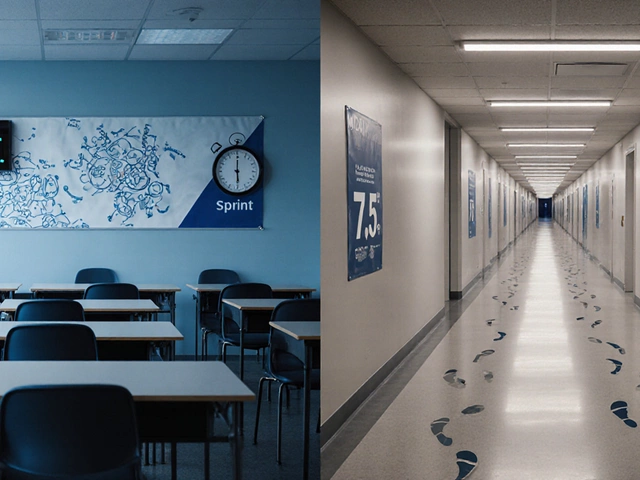
If you wander through LinkedIn on any given day, you’ll see MBA after MBA waved around like a badge of honor. Tuition keeps climbing and MBA applications still flood in, but here’s the deal: fewer people than you’d think actually know if the letters are really worth it. Every year, people drop $100K–$300K for the degree, leave their jobs, hope for massive salary hikes…and sometimes, the math just doesn’t add up. The notion that an MBA is a golden ticket is mostly a story from another era, like thinking pet rocks were a good investment. But not all the rumors are off-base. A business degree can be rocket fuel—or a money pit—depending on who you are, what you want, and your patience for group PowerPoints where half the team is hungover.
What Does an MBA Actually Get You These Days?
I’m going to be blunt—no degree guarantees success, but the MBA tries hard. Here’s what you’re really getting when you sign up:
- Network: This doesn’t mean just schmoozing. Top programs like Harvard, Wharton, and Stanford have career networks that honestly open doors you probably never knew existed. Internships, job leads, startup ideas, even investor contacts—all bundled together.
- Skillset: The coursework bakes in accounting, marketing, finance, operations, strategy. It’s like business bootcamp, only with more coffee and way more group work. And yes, you’ll run simulations and dissect real-world case studies from companies like Tesla or Unilever—no fluff.
- Career switch: Here’s a fact—about 60% of MBA grads use the degree to jump industries or job functions, according to GMAC (the folks who run the GMAT). If you’re stuck in IT but wanna be a product manager or banker, MBA’s the bridge.
- Salary boost: Money talks, right? The average starting salary after a top-10 U.S. MBA is about $175,000 (including bonuses), says U.S. News. Factor in corporate recruiters targeting MBAs for leadership pipelines.
- Brand credibility: Like it or not, “MBA” does impress hiring managers, especially from a top-tier school. It’s shorthand for “this person gets business.”
But don’t be fooled: the “network” at a small, local MBA won’t hand you the same opportunities as Stanford GSB. And those salary figures? They’re real for people who hustle, but plenty make less, lose steam, or zigzag after graduating.
One thing I learned watching Amelia and a few friends chase MBAs—beyond buzzwords and pie charts, people change. That growing confidence, ability to speak exec-speak, and willingness to take risks, all come from the sink-or-swim pressure-cooker of B-school. Can you get some of it outside? Sure. But being around go-getters, future COOs, and ex-military leaders rubs off, if you let it.
Now, if you’re thinking of a part-time MBA or an online program, keep two things in mind: They’re flexible, cheaper, and you keep your job, but the network and cachet aren’t as strong. Still, if you can’t just uproot your life, they’re a solid compromise—look up Indiana Kelley or Carnegie Mellon Tepper as remote-friendly options.
Just don’t expect an MBA to rescue a dead career or make a bored personality suddenly CEO material. It’s a tool, not a magic wand.

The Real Cost: Money, Time, and Opportunity
Let’s talk pain: that is, the true price tag. It’s not just tuition, though that’s eye-watering enough—Harvard charges $77K per year for tuition alone in 2025. Factor in housing, books, insurance, and two years of your salary lost—and the total bill shoots to $200K–$300K for top U.S. full-time MBA programs. Even outside the elite, tuition alone often runs $60K–$85K.
- Lost wages: Say you’re making $80K/year and step out for two years. Unless you’re on leave, that’s $160K you don’t earn or invest—on top of tuition.
- Debt: Roughly 54% of U.S. MBAs in 2024 took loans, averaging almost $75K, based on estimates from the Graduate Management Admission Council. Interest adds thousands more.
- Family and pets: If you’ve got a partner (Amelia rolled her eyes every time I mentioned moving to Boston for two years), or pets like my cat Nimbus, long hours and relocations can rock your home life. You’re swapping predictability for late-night classes, resumes, and recruiting pressure.
Here’s a hard truth: unless you get into a high-ranking (think: top 25 U.S. or top five global) business school, or your boss is funding most of your degree, the payback period can be far longer than the glossy brochures suggest. In India, a prestigious IIM can cost $30K–$60K, but salaries are often lower post-grad versus the U.S. In Europe, top programs like INSEAD or LBS pack months into one intense year, but tuition still hits $100K. The “ROI” calculators online? Use them. Plug in your own salary, school choices, and expected industry—don’t just hope for averages.
But there are smart plays, too. Several people I know went to state universities, paid in-state tuition, and snagged company sponsorships. There’s also the executive MBA track—a lesser-known path for those with 10+ years experience. These cost more, but you can sometimes convince your employer to pick up the tab if there’s a clear tie to your job.
Here’s a pro tip: Don’t underestimate scholarships. Yes, even at top schools. At Wharton, 30–40% of MBAs in recent years landed merit-based money. Apply widely. Tell your story. Even a $10K grant cuts interest payments by thousands later.
Finally, remember to count what doesn’t show on bank statements—missed weddings, lost weekends, stress, and the risk that “dream job” doesn’t materialize. No amount of salary boost fixes burnout or a career path you hated in the first place.

Who Actually Benefits (and Who Might Skip It)?
This is where you really need to step back. Not everyone wins with an MBA, but for some, there’s no better move.
- High-flyers: If you’re climbing fast as a product manager, banker, or consultant, and want to break into C-level jobs or top consultancies like BCG, McKinsey, or tech ops at Amazon or Google, the MBA is almost a box to check. Around 75% of Fortune 100 CEOs and one-third of S&P C-suite execs in 2024 held MBAs. Hefty numbers. But it’s not just title chasing—they know the leadership and judgment practiced at B-school is tough to replicate on YouTube.
- Career switchers: The classic “I’m sick of code, want to work client-side” story. If you’re jumping tracks—like engineering to private equity, or teaching to tech sales—an MBA can be a fresh start. Recruiters often bypass resumes without a business background. A degree flattens that barrier in a way certifications can’t.
- Entrepreneurs: This is controversial. Some of the world’s biggest founders—Zuckerberg, Jobs—skipped formal education. But for aspiring entrepreneurs, MBA gives structure, exposure to investors, and hands-on experience in scaled operations. Nearly a third of Stanford MBAs launch startups within five years. Still, startup life doesn’t need an MBA, but it does help de-risk it.
- Those with stagnant pay: If your raises stopped and you hit a ceiling, the MBA’s recruiting pipeline to new industries (with higher salary bands) can pay for the degree in five years or less—if you go to the right school. Be sure, though, that your dream employers value MBAs.
Now, who should maybe skip it?
- Older professionals: If you’re already 15–20 years into your field, companies often care more about results and network than fresh academia. Think carefully before taking on big debt.
- Deep specialists: If you’re deeply technical—senior engineer, scientist, or designer—and don’t want to shift into management, the MBA might distract you from leveling up in your niche.
- Self-motivated learners: Some people can self-study, build networks at conferences, and find mentors the DIY way. If you’re already getting the salary, skills, and network without the debt, why jump ship?
Culture fit matters too: MBAs skew competitive, outgoing, and network-junky. Love solo research, hate presentations? You might find B-school social energy draining rather than inspiring.
I always ask: What’s your end game? Want exposure? Switch jobs? Start a business? Build a global network? Sometimes, one online course or a targeted certificate (think product management at General Assembly) moves the needle more for way less cash. Neuroscience research from MIT even shows that network strength—not formal education—predicts long-haul promotions for mid-career professionals.
Last thing—don’t be afraid to pause. Jot down a list: Why do I want this? What’s my 10-year goal? Who do I know who’s actually made it work? Talk to grads, ask for real numbers, not the Instagram version. MBA isn’t one-size-fits-all, but if you play it right, you can rewrite your story—just go in with eyes wide open.




